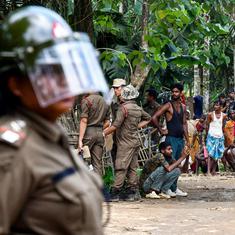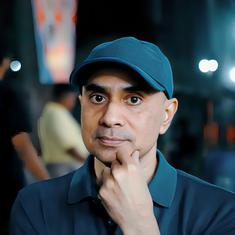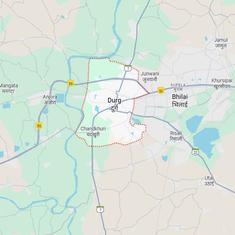Even when he had reached Chapter 100 of the 120-chapter long thriller he was writing, best-selling author Ravi Subramanian had no clue who the killer was going to be. The thrill of building the plot was an unimaginable experience, he says, and he believes In the Name of God will keep the reader guessing till the end. He spoke to Scroll.in about his ten years in publishing, moving away from books featuring bankers, and the hold that the Padmanabhaswamy Temple has on his imagination. Excerpts from the interview:
What was the principal difference from the past when writing your latest novel, In the Name of God? I know you’ve spoken about how it moves away from banking, your domain expertise.
In hindsight, moving away from my core comfort zone of banking thrillers was not as easy as I thought it would be. No wonder In The Name Of God took me two years to write. It is the first Indian contemporary thriller set in the mysterious Padmanabhaswamy Temple. The research required was quite intense. I have been to the Padmanabhaswamy Temple a few times earlier. I knew about the place. But to write a book based in the temple, one had to have perfect knowledge of the place and the events taking place therein. This was important not only from the perspective of what to write, but also what not to.
The canvas too was broader than all my previous books. A story set in a temple richer than one can even imagine in one’s wildest dreams, and in the Mumbai Diamond Bourse, which plays host to what is unarguably the largest diamond trade in the world, involving an antique smuggling racket flourishing in the shards of the 33,000 temples in Tamil Nadu needs a fair bit of effort and creativity. As if the canvas was not complicated enough, there are the murders in a temple being investigated by a Muslim CBI officer. Passions fly thick and fast in this novel, which I would not hesitate to call my best till date.
What is the most exciting thing about writing a thriller? And the toughest or most challenging?
Simple. The most exciting thing is the thrill of writing it. Readers often think that the thrill is in reading. But wait till you write your own. It is an unimaginable experience. The thrill of building your plot, introducing unpredictable twists, trying to outwit the reader, planting red herrings – all of this gives an author an unparalleled adrenalin rush. Ask any thriller writer and he will tell you that the plotting is the best phase of writing.
For me the excitement lasts till I finish writing the book, and that’s primarily due to a peculiar writing style that I have. Most authors plot the book in advance. I never do that. Somehow it has never worked out for me. I always start with a backdrop and an incident which is central to what I want to write about, and begin writing. The first chapter leads to the next and then the next and thereon till the end of the book.
So, in a way, I also discover the story as I write. It would be fair to say that while writing Chapter 75, I know only as much as the reader knows while reading Chapter 75. The benefit is that if I don’t know what the next page contains, then there is no hope in hell for the reader to know it either. The book becomes unpredictable and the story, thrilling.
In The Name Of God has 120 chapters. Even when I had reached Chapter 100 I had no clue who the killer was going to be. Now tell me, if I didn’t know who the killer was at that stage – 90% into the book – do you expect the reader to have a clue? Anyone could have been the killer. Anticipation, suspense, mystery all set in and make the experience a thrilling one.

There’s no doubt the Padmanabhaswamy Temple has caught the public (and media) attention, which your book alludes to in its many aspects. When did you first sense this would be core to your plotline? Or was the controversy that played out was what ignited the entire story?
I had always been aware of the Padmanabhaswamy temple. But the thought of writing a book against the backdrop of the temple struck me about three years ago, when the temple and the vaults hit the headlines. Some $20 billion in the vaults makes it richer than even the Vatican. So much wealth in the vaults, and not a hint of security around the temple! How about a heist then! That was the thought which crossed my mind.
I started doing my research accordingly. I read the court case papers which were online. I read the Amicus curiae reports on the misdeeds, the pilferage, the scandals, the suspicions about what was going on in the temple. Fingers were being pointed at the titular king of Travancore and his involvement. Well, it didn’t take time for a story to start taking shape.
My initial thought was: “Are we relying on the fear of god and not the fear of law to keep the Padmanabhaswamy Temple vaults safe?”. It didn’t take much time for me to change my drift to “Does god kill, or does man kill, ‘In The Name Of God’?”
“He didn’t notice the body immediately.
Not even when he dipped the holy vessel into the Padma Teertha Kulam, the divine pond, to fill it up for the Devaprasnam. It was only as he was lifting the vessel, filled to the brim with water, that the right hand of the floating body scraped against it and he saw it break through the surface of the weed-infested tank. His voice deserted him; he stood stupefied. The vessel dropped from his hand and sank to the bottom of the pond with a gurgling noise.
‘Padmanabha! Padmanabha! Padmanabha!’ he chanted loudly as he ran up the steps to the pond and sprinted towards the temple gates. Whether he was upset at having touched a dead body early in the morning or it was the shock of having found said body floating in the temple pond, or both, was difficult to say.”
It’s been 10 years since your first novel If God Was a Banker came out. What are some of the key highlights of your journey? And what advice would you give your younger self?
The last ten years in publishing as a writer have been fabulous. They have had their ups and downs, but I have been lucky. In the final analysis it has been more up than down. It has got me new friends – friends I would never have known had I stayed cocooned in the world of banking. It has taught me to stay humble. Your corporate success does not mean anything to the reader.
It taught me to learn to respect feedback. You don’t need to act on every bit of feedback you get, but if someone has written to you with inputs, it only means that person feels strongly about it. At the least, respond to it respectfully. You are there because someone paid money and bought your book to read. Respect that person and the money he or she paid.
One big revelation, which I had over the years, is that writing is one field where you don’t need to step on another person’s grave to go up in life. If you want to make someone read your book, write a good book. Market it well. Unlike the pyramidal corporate world where you go up the ladder at the cost of your colleagues, in publishing, an Amish need not sell fewer copies for a Ravi Subramanian to sell more. That’s the way readers are. That’s the way this industry is. Collaborate rather than compete. If you have to compete, compete with yourself and try to improve with every book.
As an author I have started experimenting with plots now and I am thoroughly enjoying it. I would recommend that every author try something out of their comfort zone. If I were to relive my journey as an author, I would possibly have written In The Name Of God much earlier in my writing career.
Your daughter is also a published author now – any anecdotes you can share about the “family business”, as it were?
I am so proud of Anushka’s journey as an author. She writes much better than I do. I love plotting and she loves developing characters. We are very, very different writers. At times we frustrate my wife with our discussions on writing. So much so that we have even thought of the title of the book she would write if she gets down to it – Imbalance: The Life of a Non-writer in a Writer Family. The cover will have the image of a weighing scale with me and my daughter on one side and my wife on the other side. And no points for guessing which will be the heavier side.
You’ve written very openly about how writers don’t make money in India. But that changes when you’re a commercial fiction writer, doesn’t it? What’s the magic number of copies to hit the sweet spot?
Look, it is actually not about India. It is true the world over. Only the bestselling authors make money. No one else does. An average book in India, if you leave out the bestsellers, doesn’t even sell out its first print run of 2000-3000 copies. At an average MRP of Rs 200 and a reasonably high royalty level of 10% of the MRP, a writer stands to make Rs 30,000-50,000 per book. Which is hardly anything for the effort involved in writing it.
That is why I keep saying that one must not get into writing for money. There are better ways to make the kind of money that writing can give you. If you want to be a long-term writer, write for the right reasons. Write not to pay your bills, but write when your bills are paid. That should be the mantra.
Barely 1% of writers in India cross the 20,000 copy mark. At that level one ends up making Rs 3-4 lakh as the gross royalty. Remember, this is the gross revenue. You need to net off expenses involved in promotion, travel and incidentals from this. The figure drops even further. Yes, there are other means of revenue generation for authors – talks, sale of movie/adaptation rights, etc. But even so, not many have hit the jackpot.
Don’t get swayed by the glamour that a few writers seem to possess. That said, writing is huge fun, if you have your finances covered in some other way. Despite making reasonable amounts of money in writing, I will never give up my day job and take up writing full-time. I know that the day I do that, writing will become my job and lose all the fun. I can’t afford for that to happen.
And finally, what next for you as a novelist?
I will continue experimenting and trying my hand at multiple themes. Wait for a couple of months. All I can assure you is that there is a twist in the tale, and my next one is going to be very different from anything that I have written thus far.










